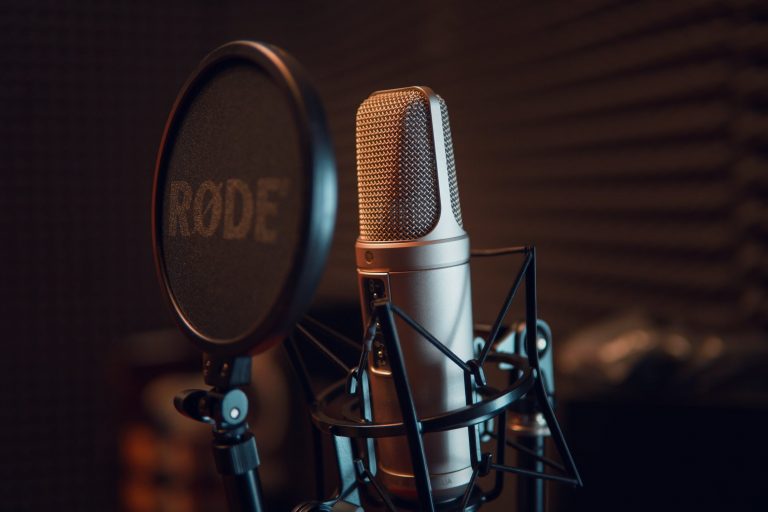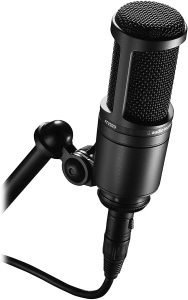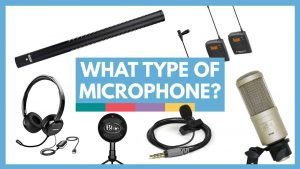Audiobooks are a fantastic way to get your book out there, and more importantly, in people’s ears. Audiobooks are not just for people who find it difficult to read because of their eyesight or other impairments – they provide much-needed relief for commuters, travelers, and bored office workers across the world.
There are a number of factors to consider before purchasing an audiobook microphone
The first thing to consider before purchasing a microphone for audiobooks is the scenario in which you will be using it.
Just because an expensive, professional mic may work for recording a podcast doesn’t mean that it will work for dictating notes to an assistant.
Next, consider the type of voice you have and how you want your audio to sound.
Table of Contents
Buying Guide on Microphones for Recording AudioBooks
Type of Microphone
The best microphones for audiobook recording are condenser microphones but they also require a power supply and are more sensitive to extraneous sound (a cough or sneeze can be heard in the recording).
A dynamic microphone is a good choice if you want your voice to be captured accurately but without surrounding ambient noise while still having freedom of movement.
Recording Scenario
If you need help with organizing interviews, there are many great apps that you can use. If you would like to record an interview yourself, you are going to need a good-quality stereo microphone.
If recording in an open setting, you will probably want to get away from the speakers and into a quieter space (use your judgment).
Don’t forget that the microphone needs to be placed close to your mouth for the best recording.
For a podcast, you may want to invest in a professional microphone but if you are only going to dictate notes, then maybe an inexpensive one will work.
If sound quality is your main concern, then purchasing a condenser microphone is worth getting.
However, these microphones require power and sensitivity to noise.
Type of Voice Over Recording
Dictating for extensive periods may tire out your voice so a dynamic mic would work well as it captures sound accurately without extraneous noise around it.
If organizing interviews or recording them yourself then there are many apps available that can help with this process.
———————————————————————————————————————————–
Related Guides:
- Best Mics for Speech Recognition & Dictation
- Best Microphone For Background Noise
- Best Room Mics for Live Recording
- Best Omnidirectional Microphones
———————————————————————————————————————————–
6 Best Microphones For Audiobook Recording
No products found.
1. Audio-Technica AT2020
No products found.
This microphone, the Audio-Technica AT2020, is a good clean choice for those looking to upgrade from their internal computer’s microphone.
Not only will it capture a wide variety of tones and frequencies it also captures them with detail.
What people may not know is that they can change the mic’s polar pattern too in order to get more specific nuances out of their recordings.
It was designed specifically with broadcast or voice-over work in mind but also works well for music recording as well as many indie artists are happy to tell you.
2. Blue Yeti USB Microphone
No products found.
The Blue Yeti is a well-known brand in the realm of audio recording and is often one of the first microphones people purchase. It has four recording modes: Stereo, Bidirectional (figure 8), Omnidirectional, and Cardioid (lens-shaped). One of its best features is its ability to switch between these modes at the user’s discretion. This microphone was designed with voice-over work in mind so those looking for voice-over work should not be looking any further than this side for a mic.
3. Neewer NW-800
No products found.
The Neewer NW-800 Condenser microphone has many features that make it a good choice for those looking to record audio. One of the best features is its built in shock mount which helps to reduce noise and vibrations that can come from the handling of the mic while recording. There are also two different mounting options: USB or stand. This makes it a great option for those looking to record music or podcasting as well as voice over work like the Blue Yeti Microphone listed above.
4. Shure SM7B
No products found.
The Shure SM7B Cardioid Dynamic Microphone is a good option for those looking for a microphone to use expressly for recording audiobooks. It has a great frequency range from 40Hz-15 KHz and it is also able to handle low frequencies without the need of another microphone to capture lows. This is ideal for audiobook narrators as it will allow them to record their voice with minimal background noise or at least reduce the amount of background noise they have in their recordings.
5. Rode Procaster USB Broadcast Podcasting Mic
No products found.
The Rode Procaster USB Broadcast Podcasting Mic is a great choice for those looking to record vocals. It has a low noise floor and is usually the first mic people will come across. This microphone also works well with voice-over work as many of its features, such as a wide frequency range, are great for such use.
6. Audio-Technica ATR-3350
No products found.
The Audio-Technica ATR-3350 Cardioid Dynamic Microphone is a good choice for those looking to record vocals. It has a wide frequency range from 100 Hz – 15 KHz and like most dynamic mics, it can capture a wide variety of tones and frequencies. This is ideal for voice-over work as it cuts out unnecessary background noise while recording your voice and will give you better clarity in your recordings.
FAQs
What Factors Make For A Great Audiobook Microphone?
For those who are interested in pursuing an interest in audiobooks on the side, you may want to consider what microphone equipment would work best for you. For the beginning audiobook listener, a good microphone should be able to pick up your voice with clarity and without distortion.
Microphones typically have two functions: first, they’re there for amplifying your voice when it’s coming through your speakers or earbuds; second, they block out background noise. Professional microphones are designed for more precise sound capture than consumer versions like those found in your average computer headset.
If you want great audio quality when recording yourself reading an audiobook or other project, then you’ll need to get a “real” microphone with greater sensitivity
What’s The Difference Between An Ideal Microphone For Audiobooks and A Typical Microphone?
Microphones generally fall into two categories: “closed” and “open”. The former is designed to work with certain speakers and earbuds, while the latter can be used with almost any type of speaker or headphone. Open-back is also the type of sound you’ll hear when listening to a live band through a PA system.
Generally speaking, closed mics are less sensitive than open ones. That means that while they’re great for taking in sound from a specific source, they’re not so good at picking up ambient noises. Open-back models, meanwhile, are known for letting in more outside sound. They also tend to have greater sensitivity so that you get the best audio quality when recording.
What Are The Advantages Of Audiobook Microphones With Great Features?
People who want to record audiobooks can benefit by choosing a microphone with the right features. One advantage is that it can help you capture your voice with a more natural sound, instead of one that sounds tinny or flat. The best microphones for audiobook recording will have condenser diaphragms and cardioid polar patterns, which are designed to give you the truest-to-life sound possible. Some are also designed to avoid noise interference.
This Will Make Finding A Great Audiobook Microphone Much Easier For You
If you want a microphone of this type, you won’t have to spend very much. Most mics of this kind are available for less than $75 online, making them very affordable. Many also come with extended warranty options so that if something breaks on the device, you can get it repaired or replaced quickly and for little cost.
FAQ:
Q: What is the best microphone for recording?
A: – Use Zoom’s DZM-1 dynamic mic if you want high-quality isolating audio; price is $59.99. – Use the Shure SM7B dynamic mic if you want a top-notch cardioid pickup for serious audio pros; price is $399. – Use AKG’s P120 condenser mic for general use and high-quality audio; price is $79.
Q: What equipment do you need to record audiobooks?
A: A computer or an iPad. I use a Mac (my business is copywriting/design/advertising,so Macs are the standard),and as a recording author,this has a great benefit — because … Recording software. Garageband is the name of the app that comes free with a Mac. … A microphone. … Headphones. … A quiet space. …
Q: How do I record a microphone?
A: – Go to https://online-voice-recorder.com/beta/ – If prompted by your browser, click Allow Microphone Access. You may also click on the Settings button to configure your microphone. – Click the red record button to begin recording. – Click the record button to end recording – Click Save to download your recording
Q: What is the best free audio recording software?
A: A better browser. Before you roll up your sleeves and start slinging software around,make sure to snag your web browser of choice. Ninite. Ninite makes loading up a new computer a breeze. … Unchecky. … Malwarebytes Anti-Malware Free. … Launchy. … 7-Zip. … VLC. … Paint.net. … Audacity. … Revo Uninstaller. …


